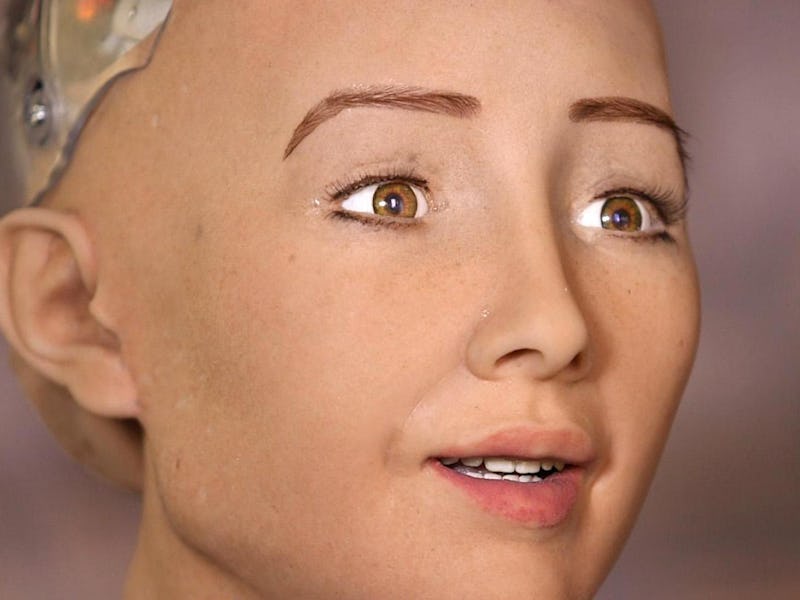The singularity is going to make us even better at being human, says leading futurist Ray Kurzweil. When it comes and we upload our brains into the cloud, we won’t need all the brain space we spend on information, he says.
When that happens, Kurzweil says: “We’re going to get more neocortex, we’re going to be funnier, we’re going to be better at music. We’re going to be sexier. We’re really going to exemplify all the things that we value in humans to a greater degree.”
On Monday, Kurzweil, a director of engineering at Google, spoke at South by Southwest in Austin, Texas with his daughter Amy Kurzweil, a cartoonist and adjunct professor at the Fashion Institute of Technology in New York. During the talk, Ray Kurzweil highlighted three big things: that we have to continue to predict change, that the singularity will happen by 2045, and that humans merging with A.I. will only make us better. Like Elon Musk’s neural lace, Kurzweil sees merging with artificial intelligence as the future. But he isn’t suggesting this because of the threat of a robot takeover. Instead, it will make us even more human.
Kurzweil doubled down on the advent of computers with human intelligence, which will happen in 12 years.
“By 2029 computers will have human-level intelligence,” he said during the SXSW panel. (He later clarified in an email his prediction, saying that the singularity will happen in 2045.) Even his clarified prediction of 2045 is earlier than other expert predictions about the rise of computers as smart as people, which have hit closer to 2047 or after.
Predicting the future of information technology and artificial intelligence means challenging the linear nature of human thought, says Kurzweil. “Our brains think linearly, and that’s the primary difference between my critics and myself.”
Since he has witnessed information technology double every year since his undergraduate career, he sees the future of A.I. changing at an exponential rate. “It’s incredible that people have lived through this exponential change and they fall off the horse, they can’t imagine it can change ever again,” he says.
“What I talk about, ultimately, that leads to computers having human intelligence, our putting them inside our brains, connecting them to the cloud, expanding who we are. Today, that’s not just a future scenario,” he says. “It’s here, in part and it’s going to accelerate.”
But he’s not particularly worried about it. The future isn’t going to look like a science fiction story with a few super intelligent A.I.s that attack us.
“That’s not realistic. We don’t have one or two A.I.s in the world. Today we have billions,” he says. And unlike Musk who imagines the rise of the A.I. as something that threatens human existence, Kurzweil says that doesn’t hold with how we interact with A.I.s today.
“What’s actually happening is they are powering all of us. They’re making us smarter. They may not yet be inside our bodies but by the 2030s we will connect our neocortex, the part of our brain where we do our thinking, to the cloud.”
After his talk at SXSW, Kurzweil emailed Inverse to clarify this statement. He didn’t mean that the singularity would happen in the 2030’s, but instead he thinks the singularity will happen in 2045.
Kurzweil wrote: “2029 is the consistent date I have predicted for when an AI will pass a valid Turing test and therefore achieve human levels of intelligence. I have set the date 2045 for the ‘Singularity’ which is when we will multiply our effective intelligence a billion fold by merging with the intelligence we have created.”
This isn’t just a pipe dream to Kurzweil, who’s had reasonable luck predicting where the future is going to go. “There are people with computers in their brains today — Parkinson’s patients,” he pointed out at SXSW panel. “That’s how these things start.” Following the path of steps from the technology we have now, to what will happen twenty years from now, Kurzweil says, “in the 2030’s there will be something you can take that will go inside your brain and help your memory.” And that’s just the beginning.
Uploading our brains into the cloud will allow humanity to waste less time on lower-level types of mental tasks, Kurzweil says. He’s very interested in the idea of uploading the neocortex because it’s responsible for things like art, music, and humor. By allowing our brains to connect more on that level, by melding with artificial intelligence, we will expand our ability to do these things and be better people. “Ultimately it will affect everything,” he says. “We’re going to be able to meet the physical needs of all humans. We’re going to expand our minds and exemplify these artistic qualities that we value.”
You can watch the entire talk here:
Update: After publication of this article, Kurzweil emailed Inverse to clarify his comments during the above SXSW interview (comments in question are at 7 minutes 20 seconds) about his prediction for the singularity, changing it from 2029 to 2045. This story has been updated to reflect his clarified comments.
